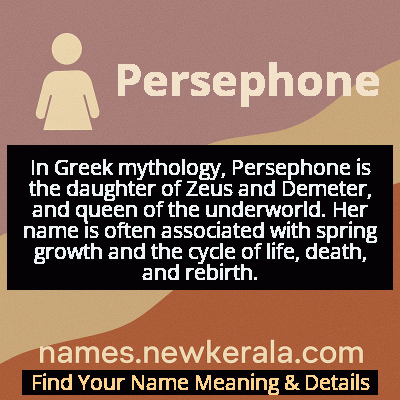Persephone Name Meaning & Details
Origin, Popularity, Numerology Analysis & Name Meaning of Persephone
Discover the origin, meaning, and cultural significance of the name PERSEPHONE. Delve into its historical roots and explore the lasting impact it has had on communities and traditions.
Name
Persephone
Gender
Female
Origin
Greek
Lucky Number
4
Meaning of the Name - Persephone
In Greek mythology, Persephone is the daughter of Zeus and Demeter, and queen of the underworld. Her name is often associated with spring growth and the cycle of life, death, and rebirth.
Persephone - Complete Numerology Analysis
Your Numerology Number
Based on Pythagorean Numerology System
Ruling Planet
Uranus (Rahu)
Positive Nature
Strong sense of order, loyal, practical, and disciplined.
Negative Traits
Stubborn, overly serious, rigid, and prone to feeling restricted.
Lucky Colours
Blue, gray.
Lucky Days
Saturday.
Lucky Stones
Blue sapphire.
Harmony Numbers
1, 7, 8.
Best Suited Professions
Managers, engineers, accountants, organizers.
What People Like About You
Dependability, discipline, practicality.
Famous People Named Persephone
Persephone Brown
Australian actress
Known for roles in Australian television series and independent films
Persephone Swales-Dawson
British actress
Played Nico Blake in the long-running British soap opera Hollyoaks
Persephone Apostolou
Greek-American academic
Classical studies professor and author specializing in Greek mythology
Name Variations & International Equivalents
Click on blue names to explore their detailed meanings. Gray names with will be available soon.
Cultural & Historical Significance
In artistic and literary traditions, Persephone has been reinterpreted countless times—from ancient pottery depicting her abduction to Romantic poetry exploring her symbolic significance. She appears in works by poets like Alfred Lord Tennyson, Swinburne, and modern feminist writers who recast her story as one of empowerment rather than victimhood. The Eleusinian Mysteries centered around her myth were so influential that they shaped Greek philosophical thought and later influenced early Christian concepts of resurrection and afterlife, demonstrating her enduring cultural impact across millennia.
Extended Personality Analysis
Those named Persephone are often perceived as possessing deep complexity and duality in their character. They may exhibit a gentle, nurturing side reminiscent of spring's bloom alongside a more serious, introspective nature reflecting their underworld associations. This name suggests someone who undergoes significant personal transformations throughout life, emerging stronger from challenges. They often possess innate wisdom beyond their years and demonstrate remarkable resilience in adversity. The Persephone personality typically balances light and shadow, capable of both joyful exuberance and profound depth, making them intriguing and multifaceted individuals who understand life's cyclical nature.
People with this name are frequently described as deeply intuitive with strong connections to nature and seasonal rhythms. They may show particular sensitivity to environmental changes and possess a natural understanding of growth cycles in both literal and metaphorical senses. Their dual nature allows them to comfort others during difficult transitions, having themselves navigated between different states of being. While they can appear mysterious or reserved initially, they reveal profound warmth and compassion to those they trust. This combination of qualities often makes them exceptional counselors, artists, or healers who help others through their own transformations.
Modern Usage & Popularity
Persephone has experienced a remarkable resurgence in popularity since the early 2000s, particularly among parents seeking mythological names with depth and historical significance. While still considered uncommon, its usage has steadily increased, ranking around #700 in the United States and showing similar growth in the UK and Australia. The name appeals to educated, literary-minded parents who appreciate classical references and strong female archetypes. Its popularity has been boosted by cultural phenomena like the Hadestown musical and Lore Olympus webcomic, which have introduced the myth to new generations. Contemporary usage often shortens to nicknames like 'Sephie,' 'Percy,' or 'Effie,' making the substantial full name more accessible for daily use. The name's four-syllable structure and classical roots place it alongside other revived mythological names like Athena, Aurora, and Calliope in modern naming trends.
Symbolic & Spiritual Meanings
Persephone symbolizes the eternal cycle of life, death, and rebirth—a powerful metaphor for personal transformation and resilience. Her journey between the upper world and underworld represents the human capacity to navigate different aspects of existence: joy and sorrow, light and darkness, innocence and experience. She embodies the concept of necessary endings leading to new beginnings, making her name symbolic of hope during difficult transitions. The pomegranate seeds she consumed in the underworld signify commitment and the irreversible nature of certain choices. Ultimately, Persephone represents the integration of opposites—showing that depth and darkness can coexist with light and growth, creating a complete, multifaceted individual. In psychological terms, she embodies the process of individuation, where one acknowledges and integrates all aspects of self to achieve wholeness. Her story continues to inspire those navigating major life changes, offering a mythological framework for understanding personal evolution.

